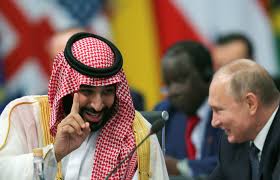Was the OPEC+ decision a game-changer in US-Gulf relations?

What is at stake today is not US protection for the Gulf states but rather the increasingly hostile attitude of the United States to its so-called “allies”
The first thing that is likely to come to one’s attention when looking at the reactions to the OPEC+ decision to cut oil production is that the responses are mostly American. Virtually all US officials and cabinet members, from the president down, have had something to say about the matter.
Of course, the United States is the top oil producer in the world. It is also the leading hydrocarbon consumer. But years ago, it stopped importing crude oil from abroad after US companies invested heavily in the shale industry, modern technology helped revive old wells and allowed the expansion of seismic surveys to reach new fields. The United States is self-sufficient in oil, even selling its surplus production to foreign nations.
But Washington is not self-sufficient politically. Even before the Cold War ended and the United States became the sole superpower of the world, Washington used to impose its will on others on many global political and economic issues. With the collapse of the Soviet Union and Iraq’s defeat in the Kuwait War, this evolved into a hegemonic tendency. On top of the political, military, industrial, financial and cultural clout it acquired since the early nineties, the US has accumulated new leverage with the communications and information technology revolution. Certain aspects of that power came as fait accompli to others while other aspects were deservedly the result of long-term US investment in education and innovation. For more than two decades, the United States has had the final word in determining the world’s fate. Then came the major financial shock of 2008 and the subsequent US and Western downward spiral, starting with military and strategic setbacks following the invasion of Iraq before falling beneath the weight of financial crises.
No other major Western countries have really complained about the OPEC+ decision, nor did East Asian countries, who are the largest consumers of Gulf oil. But the US has not stopped complaining and threatening to react. There are clear political concerns behind Washington’s complaints. The US mid-term congressional elections are just around the corner and the Biden administration got itself into the trouble by linking the prices of petrol and diesel to the administration’s approval ratings. The price that an American pays to fill his fuel tank has become a benchmark for the Democrats’ ability to continue to control the US Congress or not.
But the most important political dimension goes beyond the predicament of the current US administration. The last ten years have witnessed a fraying of the United States’ ability to impose its global hegemony. Various American miscalculations caused major crises in more than one region of the world. Before the Ukraine war, which Moscow sees as having been provoked by the expansion of NATO to its borders and before the Taiwan crisis, motivated essentially by the US desire to contain China’s global rise, Washington failed to properly address the Iranian threat in the Gulf.
Besides trying to tinker with Middle East stability by putting an illusory Islamic democracy concept into the hands of the Muslim Brotherhood during the earthquake of the Arab Spring, the United States let Iran draw a new geopolitical map for the region. Iraq was handed over to Iran on a silver platter while Tehran’s Houthi proxies were allowed to complete the Iranian southern encirclement of the Gulf states. This came on top of the role long-played by Hezbollah in Lebanon and the more recent presence of the Islamic Revolutionary Guards in Syria.
American disregard for the security of the Gulf reached its apex with the drone and missile attack on the Abqaiq oil facilities in Saudi Arabia, which did not elicit any US reaction.
Today, US officials are pondering an appropriate response to the OPEC+ decision. When they look at their options, they undoubtedly are not alluding to Russia as a possible target since it is already on the sanctions list. They mean Saudi Arabia and then the Emirates. There are 13 members in OPEC and 11 other members in OPEC+. But the US aims to politically target the two leading members of OPEC. What the Biden administration did not openly say was left to members of Congress to spell out, as they talked about stopping arms sales and withdrawing US troops from Saudi Arabia. Their argument was that the oil producers in the Gulf region did not stand with the United States in the face of the oil prices challenge. But if one considers the interest that Saudi Arabia, the UAE and the rest of the OPEC+ countries have in selling their oil at higher prices and ensuring more income, for purely commercial considerations, are Saudi Arabia and the UAE obligated to stand with Washington to meet its challenges?
The same question can be put, but from the opposite perspective: did the United States stand with Saudi Arabia and the UAE as they faced the Iranian threat? The answer was obvious in Abqaiq and over the skies of Riyadh and Abu Dhabi.
The Iranians have been flexing their muscle for years through drones and missiles. The Houthis are now returning to their threatening rhetoric after the first signs of the truce in Yemen falling in disarray. US reluctance to confront the Iranian show of force was always a reality. The notion of US protection of the Gulf region is not credible anymore.
However, what is at stake today is not US protection for the Gulf states. What is at stake is the increasingly hostile attitude of the United States to its so-called “allies”. Washington can be a dangerous and pernicious enemy. Waving the threat of the anti-monopoly resolution (NOPEC) is a first indication of the extent to which the US administration, in coordination with Congress, is willing to go to punish its “allies.” Political pressure on the Gulf countries can come in many shapes and forms. It can find expression in the media, as was the case after the murder of Saudi journalist Jamal Khashoggi and the subsequent smear campaigns. Can the US official establishment accept the latest OPEC+ decision, despite President Biden personally going to Jeddah a few weeks ago, asking that the Gulf countries increase their oil production and ending up being rebuffed with the OPEC+ decision?
The lobbies working for the Gulf countries in Washington are powerful and influential. Certainly, these lobbies are aware of what is going on in the whole US establishment, not just within the American administration. Perhaps the Gulf states’ consultants, who include former US officials and other experts, have a more comprehensive view of the options being considered, some which are being reflected in the media debate or in the statements of senior officials. Perhaps these lobbies can exert some influence to calm tensions. But Gulf leaders should in any case anticipate painful reactions.
Perhaps someone could eventually come forward to say: “This was tit for tat. You failed us the day you let Iran control the fate of the region. And now we failed you when you asked us to stand with you against Moscow and to back your demand for more oil output. That being the case, can we now open a new chapter in our relations?”
Dr. Haitham El Zobaidi PhD
Want to chase the pulse of North Africa?
Subscribe to receive our FREE weekly PDF magazine













